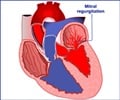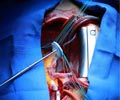- Hospitalization statistics for Mitral valve disease: - (http://www.wrongdiagnosis.com/m/mitral_valve_disease/stats.htm#medical_stats)
- Heart & Vascular Institute (Miller Family) - (http://www.clevelandclinic.org/heartcenter/pub/guide/disease/valve/mvrepairfaq.htm)
- Mitral valve regurgitation - (http://www.nlm.nih.gov/medlineplus/ency/article/000176.htm)
- Congenital Mitral Stenosis With or Without Associated Defects - (http://circ.ahajournals.org/cgi/content/full/102/suppl_3/iii-166)
- Mitral Stenosis - (http://www.emedicine.com/med/topic1486.htm)
- Congenital Mitral Stenosis - (http://www.emedicine.com/ped/topic2517.htm)
About Mitral Valve Stenosis Replacement
Mitral valve replacement is replacing the diseased mitral valve with an artificial valve.
Mitral valve replacement is a surgical heart procedure to correct either the narrowing (stenosis) or the leakage (regurgitation). The surgery requires opening the chest and is performed by a specialist called ‘cardiothoracic surgeon.#$#
The Mitral valve has two flaps or leaves that work as a one way "inflow valve" for the left side of the heart. The valves are normally very robust, cause no problems, last a lifetime and generates almost 3 billion heartbeats in its lifespan.
The heart works like a pump and as it constantly beats it carries oxygen and nutrients to all of our 10 trillion body cells. Each day our blood travels 60,000 miles (or 96,000 Kilometers) through the big and smaller vessels in the body and it pumps over 2,000 gallons (i.e. approx 7,600 liters) of blood. To handle this load the four valves of the heart have to function very efficiently. A narrow valve or a leaking valve can play havoc with the function of many organs of the body.
In India, rheumatic fever is a major problem in children and young adults. It is one of the leading causes for mitral valve disease in developing countries. Every 2-11 per 1000 children develops rheumatic heart failure in our country. Preventing rheumatic heart disease by promptly treating rheumatic fever is essential. In the western countries, Mitral valve prolapse has replaced rheumatic fever as the leading cause of Mitral valve disease.
Mitral valve disease due to small stenosis or regurgitating valve may not require surgery and more so if the patient is asymptomatic.
Heart lung machine used in open-heart surgeries were developed in 1950s. About a decade later, it was possible for surgeons to perform the first mitral valve replacement. Up to 1980s, the only surgical option for patients with mitral disease was a replacement but all this changed when a French surgeon, Alain Carpentier published a paper on Mitral Valve repair. Since then, repair is predominantly done for mitral valve disease. Replacement is needed on patients with severe damage to the valve structures. Mitral Valve repair can be done through an angiogram approach or by an open-heart surgery. Repair usually involves removal of excess tissue or reshaping the valve.
Patients usually have no symptoms after mitral valve replacement. The artificial valves, especially mechanical, lasts a lifetime. The two main disadvantages of mitral valve replacement are infection and the need to give patients blood thinners for lifetime. Both can cause life-threatening complications; hence monitoring and regular follow up is a must after the surgery. Instead of mechanical valves tissue valves form a donor can be used. But the downside is that they may not last a lifetime and may need replacement after 10 to 15 years.
Isolated Mitral valve replacement can take approximately 3- 5 hours.
Hospital Stay is about 7-10 days.













Patients undergoing mitral valve replacement are susceptible to the following risks. Bleeding, infection, complex reaction to anesthetic. The risk involved in most cases can be determined by the physician and it depends on a variety of factors such as the patient’s age, general condition, specific medical problems and heart functions.
Alternative treatment is Balloon valvuloplasty.Balloon valvuloplasty is performed using a catheter, i.e. a very thin flexible tube which can be inserted into the body, with a balloon at the end. The balloon is put inside the valve and is expanded thus stretching the valve and bringing it back to its normal size. For more info: heart-consult.com/articles.
can you pl guide me what to do i have mitral valve balooning twice after gap of 10 years and presently,I am only 30 years old.I am on acitrom 2 mg [Anticoagulant], metolar 25 mg and Penicilin 10 lacs once in three weeks.I am having feeling of irregular heart beating and sometimes irregular palpitations.I had undergone check up in 2008 june last time everything was ok and there was no need of balloning that time.Is it possible that there may be severe damage only in these two yaers that is between 2008 to 2010.Pl suggest and what could be the situation.
hallo, i am suffering from mitral valve stenosis for about 3.5jear. am like you help me without operation.
My mother had sucessive surgery. I flew her to NYC to see Dr David Adams ..the worlds greatest in mitral valve repair and replacement. His entire team at Mount Sinai is fabulous. He see patients from around the world.
i am suffering from Mitral stenosis(Moderate-severe)and Mitral regurgitation(Mild-moderate).The disease surfaced some 5/6 months back.i am intrested in the latest non surgical treatment.please guide/help me.thanks with regards,waiting for your reply.